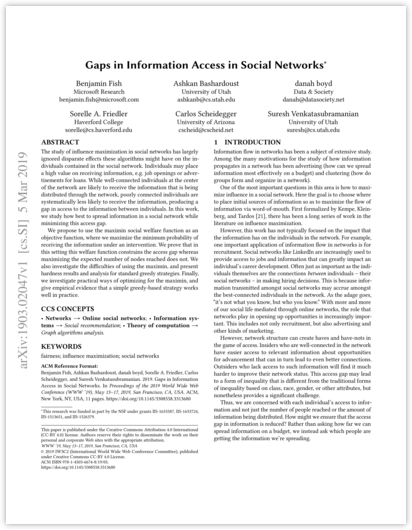Gaps in Information Access in Social Networks
Citation
Benjamin Fish, Ashkan Bashardoust, danah boyd, Sorelle Friedler, Carlos Scheidegger, Suresh Venkatasubramanian. Gaps in Information Access in Social Networks. The World Wide Web Conference (now called The WebConf), 480–490, 2019.
@inproceedings{fish2019gaps,
title={Gaps in Information Access in Social Networks},
author={Fish, Benjamin and Bashardoust, Ashkan and boyd, danah and
Friedler, Sorelle and Scheidegger, Carlos and
Venkatasubramanian, Suresh},
booktitle={The World Wide Web Conference},
pages={480--490},
year={2019},
organization={ACM}
}
Abstract
The study of influence maximization in social networks has largely ignored disparate effects these algorithms might have on the individuals contained in the social network. Individuals may place a high value on receiving information, e.g. job openings or advertisements for loans. While well-connected individuals at the center of the network are likely to receive the information that is being distributed through the network, poorly connected individuals are systematically less likely to receive the information, producing a gap in access to the information between individuals. In this work, we study how best to spread information in a social network while minimizing this access gap.
We propose to use the maximin social welfare function as an objective function, where we maximize the minimum probability of receiving the information under an intervention. We prove that in this setting this welfare function constrains the access gap whereas maximizing the expected number of nodes reached does not. We also investigate the difficulties of using the maximin, and present hardness results and analysis for standard greedy strategies. Finally, we investigate practical ways of optimizing for the maximin, and give empirical evidence that a simple greedy-based strategy works well in practice.
